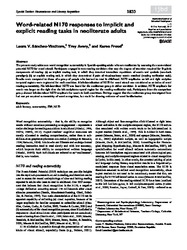Please use this identifier to cite or link to this item:
http://cris.unibe.edu.do/handle/123456789/20| DC Field | Value | Language |
|---|---|---|
| dc.contributor.author | Sánchez-Vincitore, Laura | - |
| dc.date.accessioned | 2020-02-06T15:04:18Z | - |
| dc.date.available | 2020-02-06T15:04:18Z | - |
| dc.date.issued | 2017 | - |
| dc.identifier.citation | International Journal of Behavioral Development, 42(3), 321–332. | - |
| dc.identifier.uri | https://cris.unibe.edu.do/handle/123456789/20 | - |
| dc.description.abstract | The present study addresses word recognition automaticity in Spanish-speaking adults who are neoliterate by assessing the event-related potential N170 for word stimuli. Participants engaged in two reading conditions that vary the degree of attention required for linguistic components of reading: (a) an implicit reading task, in which they detected immediate repetitions of words and symbols (one-back paradigm); (b) an explicit reading task, in which they determined if pairs of visual-auditory words matched (reading verification task). Results were compared to those of a group of people who learned to read in childhood. N170 amplitudes on left and right occipito-temporal regions were registered for each condition. A left-lateralization of N170 for word stimuli was considered as an index of word reading automaticity. No left-lateralized N170 was found for the neoliterate group in either condition. In addition, N170 amplitude for words was larger on the right than the left occipito-temporal region for the reading verification task. Participants from the comparison group showed left-lateralized N170 amplitude for words in both conditions. Findings suggest that the neoliterate group investigated here had not yet acquired automaticity of word recognition, but could be showing evidence of word familiarization. | en |
| dc.language.iso | English | - |
| dc.relation.ispartof | International Journal of Behavioral Development | - |
| dc.rights.uri | https://creativecommons.org/licenses/by-nc-nd/4.0/legalcode | - |
| dc.subject | Ciencias Sociales | - |
| dc.subject | Ciencias de la Salud | - |
| dc.title | Word-related N170 responses to implicit and explicit reading tasks in neoliterate adults | en |
| dc.type | Journal Article | - |
| dc.rights.license | Under SAGE's Green Open Access policy, the accepted version of this article may be posted in the author's institutional repository and reuse is restricted to non-commercial and no derivative uses. | - |
| dc.identifier.doi | 10.1177/0165025417714063 | - |
| dc.rights.holder | © The author(s) 2017 | - |
| dc.contributor.affiliation | Laboratorio de Neurocognición y Psicofisiología (NEUROLAB) | - |
| dc.relation.issn | 0165-0254 | - |
| dc.description.volume | 42 | - |
| dc.description.issue | 3 | - |
| dc.description.startpage | 321 | - |
| dc.description.endpage | 332 | - |
| dc.subject.keywords | Adult literacy | en |
| dc.subject.keywords | Automaticity | en |
| dc.subject.keywords | ERP | en |
| dc.subject.keywords | N170 | en |
| dc.contributor.authors | Sánchez-Vincitore, Laura | - |
| dc.contributor.authors | Avery, T. | - |
| dc.contributor.authors | Froud, K. | - |
| dc.typeofaccess | Open Access | - |
| item.grantfulltext | open | - |
| item.cerifentitytype | Publications | - |
| item.languageiso639-1 | English | - |
| item.fulltext | Con texto completo | - |
| item.openairetype | Journal Article | - |
| item.openairecristype | http://purl.org/coar/resource_type/c_18cf | - |
| crisitem.author.dept | Laboratorio de Neurocognición y Psicofisiología (NEUROLAB) | - |
| crisitem.author.parentorg | Universidad Iberoamericana (UNIBE) | - |
| Appears in Collections: | Publicaciones del NEUROLAB-UNIBE Publicaciones indexadas en Scopus / Web of Science | |
Files in This Item:
| File | Description | Size | Format | |
|---|---|---|---|---|
| 2017. Sanchez-Vincitore. World-related_Green.pdf | Full text [open access] | 701.03 kB | Adobe PDF |  View/Open |
This item is licensed under a Creative Commons License

